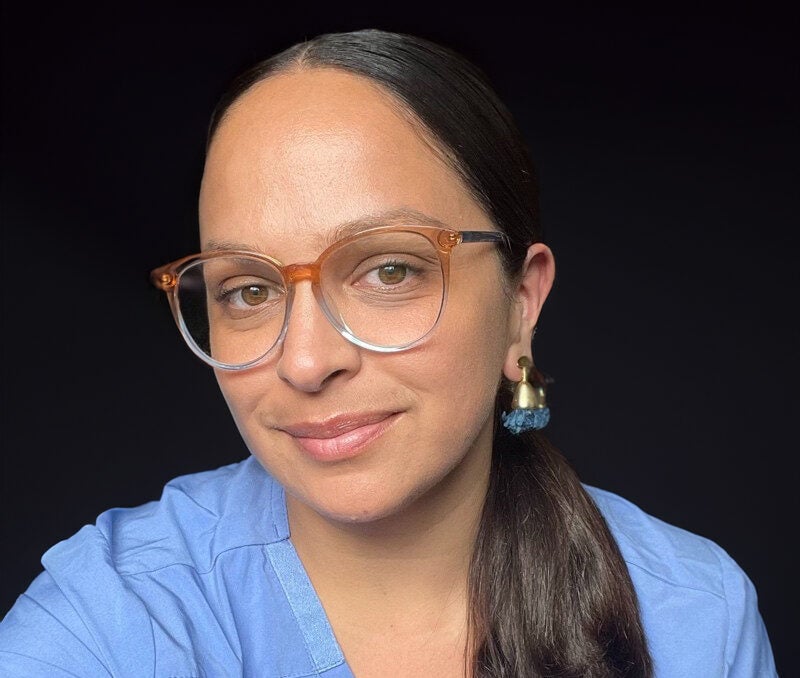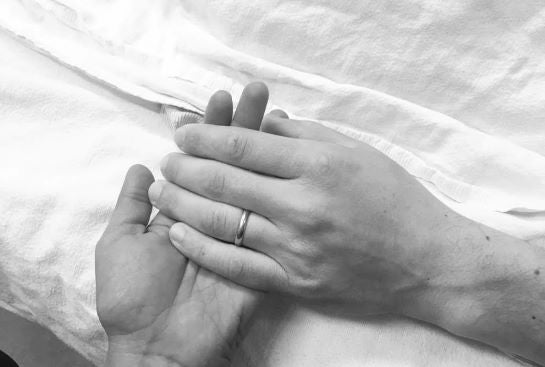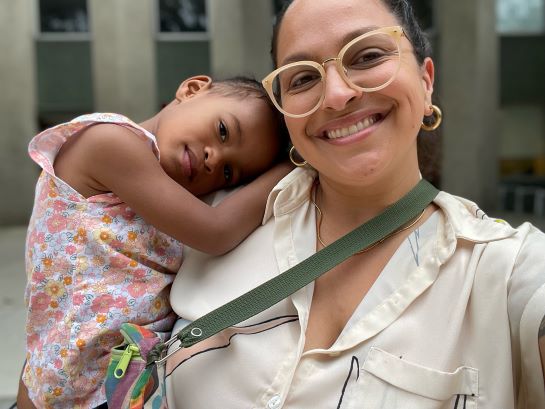Master’s program offers a refocus for photographer
As Anjali Pinto prepares to graduate with her MSN this December, she reflects on how a devastating loss gave her an unexpected superpower.
QUOTE: Heartbroken seems too soft an expression. Heart shattered. Heart tortured. Heart obliterated. Mangled. Decimated. Bulldozed.
Heartbroken seems too soft an expression. Heart shattered. Heart tortured. Heart obliterated. Mangled. Decimated. Bulldozed.
| Dec. 20, 2017
body copy

Those were Anjali Pinto’s words in an Instagram post after her husband, Jacob Johnson, died suddenly from a ruptured aortic dissection at the age of 30.
Now, eight years after his death, Pinto says the unimaginable grief has given her an ability to empathize with patients and advocate for them, which she calls her “superpower.” Pinto is expected to graduate with her master’s of science in nursing from the UIC College of Nursing in December.
“I see patients experiencing trauma and grief, and they’re scared out of their minds,” she says. “They don’t know what to expect. I can be there with them through that and help them adjust. I can try to deliver the news in a way that allows them to have some autonomy through the process.”
Before the death of her husband, Pinto was a photojournalist who freelanced for the New York Times, the Washington Post, and the Wall Street Journal. She also worked as a photographer for a large restaurant group in Chicago. She had been married for just 16 months when she discovered Johnson unresponsive in their bathroom on New Year’s Eve 2016.
Johnson had no known health problems. The only sign that something might be wrong occurred a few days earlier when he experienced pressure in his neck and spots in his vision. After calling 911, medics tried to revive Johnson for about 30 minutes. He was pronounced dead when he arrived at the emergency room.
Lessons in what not to do

One moment he was alive with a bright future; the next, he was gone.
Pinto documented her loss with photos on Instagram, processing her grief in a public way and drawing more than 42,000 followers.
Pinto’s brief conversation with the ER doctor now informs her conversations and interactions with patients.
She recalls him saying, “I didn’t work on this patient,” when she was looking for an explanation for Johnson’s unexpected death.
“The doctor was so cold and unhelpful and unsympathetic and just unaware of the impact that short conversation was going to have on my life,” she says. “I was up close to how poorly things can be handled when you happen to meet the wrong person at the wrong time.”
After Johnson died, Pinto sought a career change and began considering the health sciences. Taking prerequisite science courses during the COVID-19 pandemic, she zeroed in on nursing as a career with flexibility, where she could pursue specialties or advanced degrees.
“I wanted to find a place to land where my personal and professional skills could be utilized to help people during vulnerable moments of their lives,” she says.
She cites the incident with the ER doctor as one that’s given her particular empathy when a health issue is likely to dramatically alter a patient’s expectations for their future.
Nurse advocate

Since finding the graduate-entry master’s program at UIC Nursing, Pinto has flung herself fully into it.
Besides her rigorous, full-time course load, she has an externship in labor and delivery at the University of Chicago Medicine and took a job with the Outbreak Response Team, co-led by associate professor Rebecca Singer, DNP ’18, RN. The team goes into long-term care facilities, migrant shelters and other facilities with vulnerable populations to offer vaccinations and testing. She was on-site during the team’s response to a measles outbreak in a Chicago shelter for migrants last spring.
That experience led to a project—now supported by a Schweitzer Fellowship— to create a holistic support program for migrant women, particularly new mothers, in Chicago shelters. This will include providing a “Mom Go Pack” of essential postpartum supplies, education on safe sleep practices, and building a peer-mentor network for migrants.
Pinto is now a mom herself with a 4-year- old daughter named Ndidi. After seeing pregnant women in migrant shelters, she recognized how “overwhelming” it would be to bring a baby into a foreign environment.
“I try to advocate for people who may have different lived experiences than the nurses and doctors that provide for them,” she says. “I try to act as a bridge. I push back when I hear opinions or generalizations about people that I think are unfair. I’m not afraid to stand up for people.”